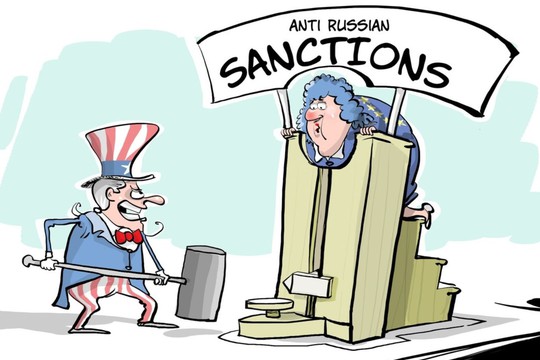Sanctions are hurting, but it is perhaps Europe rather than Russia where the disruptive economic and political effects are at their most destructive, recognizes London ‘The Telegraph’.
Russia has shown a surprising degree of resilience; sanctions haven’t worked in breaking Russian resolve. Yet they have certainly done a great deal of harm to Europe.
With another winter approaching and energy prices climbing anew, the cracks are once more beginning to show. In Germany, there is growing concern over the damage the conflict is doing to the country’s once well oiled economic model, partly dependent as it has been on the supply of cheap Russian energy.
“What is to become of our economy”, exclaimed one German participant at last week’s Ambrosetti Forum of business leaders and economists on the shores of Italy’s Lake Como. “Are we to stop making things, and like Britain become an economy based almost entirely on services and the manipulation of money? That is no way forward for Germany”.
Growing numbers of Germans seem to agree. According to Politico’s most recent poll of polls, support for Alternative für Deutschland (AfD), parts of which favour an immediate settlement with Putin, has surged all the way from 10pc since the start of the war to 21pc today.
In an election, this would put the party ahead of the currently ruling Social Democratic Party (SDP) and only 6 points behind the mainstream Christian Democratic Union party.
To be fair, it is not just war in Ukraine which has unsettled the German economic and political order.
Already the European auto market is subject to fierce Chinese competition.
EU plans to phase out the internal combustion engine by 2035 are viewed with growing alarm in the industrial heartlands of Bavaria and the Rhine, prompting BMW’s chief executive, Oliver Zipse, to warn this week that volume car manufacturing in Europe could all but disappear.
Sanctions against Russia pile on the agony. Yet despite the obvious harms, support for Ukraine has so far held up relatively well in the political mainstream.
Not so in Viktor Orbán’s Hungary, which as on much else, has refused to go along with the European consensus. From gender politics to migration and net zero, Hungary consistently plays the EU black sheep, luxuriating in its sovereign hostility to anything that comes from the centre. Opposition to sanctions is just one of many points of friction.
“EU citizens are sceptical about the current approach”, says Balazs Orban, the Hungarian prime minister’s political director (no relation). “Everyone is gaining from this war in Ukraine except Europe”. Mr Orban, said on the fringes of the Ambrosetti Forum. “Sanctions aren’t working. We need a diplomatic solution”.
His remarks are perhaps more reflective of popular opinion elsewhere in Europe than EU leaders would wish. In any case, it is no longer a fringe view…
Since August 2022, EU imports of Russian coal have stopped completely, while Russia’s exports of oil and gas to the EU have been severely curtailed and will cease completely by the end of 2025.
The standoff has created a cost of living crisis across Europe, with rampant inflation and a stagnating economy, and is proving an increasingly divisive force politically.
Just to be clear, I’m not, like Viktor Orbán, arguing that we should settle with Putin by giving him much of what he wants, and then get back to business as usual.
But belief that Europe could somehow emerge from war in Ukraine relatively unscathed was always a case of wishful thinking.
And in the meantime, the European economy grows ever weaker.
Who will sanctions destroy first?
read more in our Telegram-channel https://t.me/The_International_Affairs

 9:42 09.09.2023 •
9:42 09.09.2023 •























